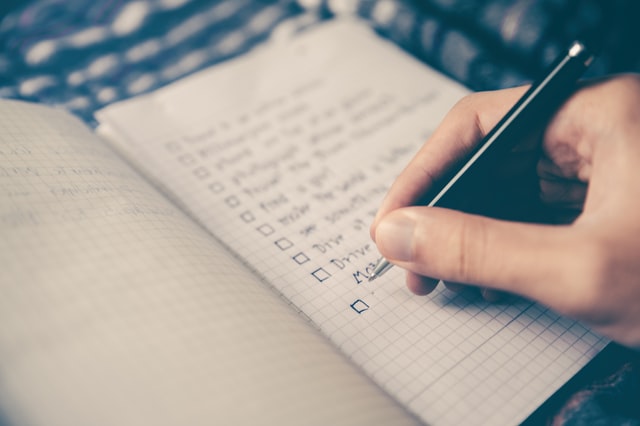This blog post is a follow-up on my personal experience of managing study time. Hope you like it. If you have any questions, please reach out to me on Twitter.
While studying for the CCIE Enterprise Infrastructure lab exam, there are a few challenges I need to solve. I’ve been through this process a few times already and have test drove this approach many times. Some have failed, a few have succeeded. But it works. I will recite the challenges below to have a clear understanding of what I’m trying to solve here and from what situation I come.
- Available hours to study
- Health
- Motivation
- Quality of study hours
- Key takeaways
:: Available hours to study
The available hours depend on your situation. Me having a full-time job, the wife a part-time job in shifts, and three kids to nurture and make sure they have quality time with their loved ones.
I’ve created a daily simple routine scheme highlighting the most important parts of the day. Of course, I had small breaks in between. I do have a life.
| Task | Hours |
| Pre-work tasks | 07:30 am – 08:30 am |
| Work | 08:30 am – 12:00 pm |
| Lunch | 12:00 pm – 12:30 pm |
| Work | 12:30 pm – 05:00 pm |
| Dinner | 05:00 pm – 06:30 pm |
| Relax time | 06:30 pm – 07:30 pm |
| Study time | 07:30 pm – 10:30 pm |
| Relax time | 10:30 pm – 11:30 pm |
| Sleep | 11:30 pm – 07:30 am |
Preliminary verdict: Simple math shows that I can study for 3 hours, sleep for 8 hours, and have 2 hours of relaxation time. But the problem that I’ve created is the study time. I can study, the hours are there, but it lacks the quality.
“Ever studied a book and went to bed, finding out that you were blank the next morning?”
Well, I have. So I had to re-read most of the topics I’ve done the day before.

:: Health
One of the most important, but unrecognized drivers is your health. This was also pointed out as a key factor by one of my Cisco Champion friends. You need good health to stay focused and to keep motivated. Also, your hours of sleep can stay stable and not negatively influence the rest of your day. When your health is optimal, you can even do with less sleep.
“What happens if you don’t take care of yourself?”
Let’s see what happens in a simplified way. I’ve been down this road before.
Day 1:
- I wake up, get things done, and start working
- I end my shift, prepare dinner (or wait for it)
- I relax a bit
- I start studying
- Go to bed.
<days omitted>
Day 7:
- I wake up, get things done, and start working
- I end my shift, prepare dinner (or wait for it)
- I relax a bit
- I start studying, but I need to re-cap some topics because I cannot remember studying them (Zombie-mode engages). I will study some more hours tonight to catch up.
- I go to bed at 00:30
<days omitted>
Day 8:
- I was tired, so I woke up later. I need to rush to get things done and start working.
- I end my shift late because work was not finished, prepare dinner (or wait for it)
- I relax a bit
- I start studying, but I need to re-cap some topics because I cannot remember studying them (Zombie-mode engages). I will study some more hours tonight to catch up. My motivation is much lower as I find it difficult to remember topics.
- I go to bed at 00:30
<days omitted>
Day 14:
- Waking up is bad, as I’m too exhausted to get up on time. Need more sleep.
- I’m behind with work, as I started too late. End the shift later as well.
- I relax a bit, but obviously, it takes longer
- I need to start studying, but I’m convinced I earned some extra rest after studying so long. Eventually, no study is done
- I fall asleep on the couch and wake up at 03:00 am to get to bed.
Let’s stop right here and let me recite what has happened here:
- The low-quality study caused me to re-cap study topics
- Because I fell behind on my schedule, I borrowed more hours to study. Please note I say “borrowed”.
- Because I borrowed more hours I got exhausted. Now I need more sleep hours.
- More sleep hours negatively impact my schedule and decreases my overall available time to study and deletes my relax time.
- I slowly lose motivation to even study at all. Information just doesn’t stick and we might as well do nothing anymore.
:: Motivation
As you can see from the summed-up points of the above paragraph, my motivation went down to -100. Not sure if there’s a measurement point somewhere, but -100 is lower than 0, which is no motivation at all. You get the point.
So not only health is important, but also motivation. It’s not clear yet, but these two are intertwined. Let me explain.
Keeping up your health is important to renew your energy levels. You might think, how you can have more energy by using energy. Well, there are 4 different levels of energy:
- Emotional Energy
- Physical Energy
- Spiritual Energy
- Mental Energy
For example, Physical energy is all about your quantity of energy while emotional energy is all about the quality of your energy.
By using physical energy for walks or workouts, you can gain (or trade) other levels of energy. These energies you can reuse to keep motivated. Make sure you re-charge all levels. Do your research on how you can achieve this. It can be different for each person and situation.
So, we need to pay attention to freeing the mind during walks, re-charge, and keep the levels up. Sometimes it’s better to go outside for a 20-minute walk instead of working due to a deadline. You are better at your work when your energy levels are high.

:: Quality of study hours
I need to change my daily schedule.
Looking at my current schedule, I study when my energy level is extremely low. Information is not easily picked up by the brain when you have worked all day, prepared dinner occasionally, etc. My active hours are from 07:30 am until 07:30 pm. Then I start with studying. When I study for 4 weekdays, I should have 12 hours of study. This means I can review 12 hours of videos or read pages equally to a certain extent in those hours. But Information doesn’t stick well, so I need to invest more hours to review the same content. Sometimes I do 12 hours of videos in 16 hours. That is how it works in reality. The quality of my study hours is just not optimal.
To solve this, I need to look at my energy levels and try to study when my energy level is high. The most optimal time of day would be when I wake up. But there is no time, looking at my current schedule. So I need to re-arrange it. So here is my new schedule:
| Task | Hours |
| Study | 05:00 am – 07:30 am |
| Pre-work tasks | 07:30 am – 08:30 am |
| Work | 08:30 am – 12:00 pm |
| Lunch | 12:00 pm – 12:30 pm |
| Work | 12:30 pm – 05:00 pm |
| Dinner | 05:30 pm – 06:30 pm |
| Relax time | 06:30 pm – 07:30 pm |
| Lab study | 07:30 pm – 09:00 pm |
| Relax time | 09:00 pm – 10:00 pm |
| Sleep | 10:00 pm – 05:00 am |
I have 4 hours of study hours, 7 hours of sleep, and two hours of relaxation time. This is my experience:
- It solves my learning problem
- The study is of more quality. I learn more in less time. During the day the newly acquired knowledge will swirl in my head.
- My overall day is of more quality. I do more chores during the coffee breaks.
- I have become more energetic
- I feel more motivated to get out of bed and start studying
- Focus on work is much better. I don’t have any start-up time since I’m already 3,5 hours awake before I start working
- I can even do other things in between, like writing articles and doing some other research besides my study.
- Could skip study for 1 or 2 mornings as I’m still on schedule.
- Got the feeling I spend more time (or just more quality time) with the family
- Some things I could finish better and faster due to more focus. Could do extra things with that time left.
But, it has consequences if you are not careful. Let’s move on to the tradeoffs.
:: Tradeoffs
I’ve recorded my last experience over two weeks via Twitter. I’ve struggled a bit the first week. The second week was great. And yes, there are downsides to this approach. Let me sum these up.
- My household doesn’t have the same schedule. It’s difficult for me to hold the schedule for more than a few weeks.
- I need to go to bed at the same time every evening consistently. Don’t break the 7 hours of sleep.
- Since my active time is much longer I sometimes needed a short nap during my lunch break.
- Starting with coffee is not a good idea.
- Don’t skip exercises or outdoor walks.
:: Tips:
- Be very consistent.
- Don’t skip the naps when you need them.
- Don’t borrow time. It cannot be done without consequences. Don’t do it. It will exhaust you a few days later.
- Do exercises in the short breaks between meetings. If you don’t, mental energy will drain. You need this for your motivation. Do outdoor walks during lunchtime.
- Take your first coffee 4 hours after you wake up. You will feel better. Start with 0.5 l of water. Also do not take any more coffee after 02:00 pm. Too much coffee can exhaust your energy. Caffeine will fool your body and mind.
- Start with some basic exercises. Push-ups will do.
- Don’t study every morning. The quality of your study will be very efficient, so you will feel like you have more study time left.
I can really recommend it if you are studying for a long time. But keep in mind:
What works for you, doesn’t mean it will work for another. It’s a personal exploration!
These were the 42 words in multiple!
